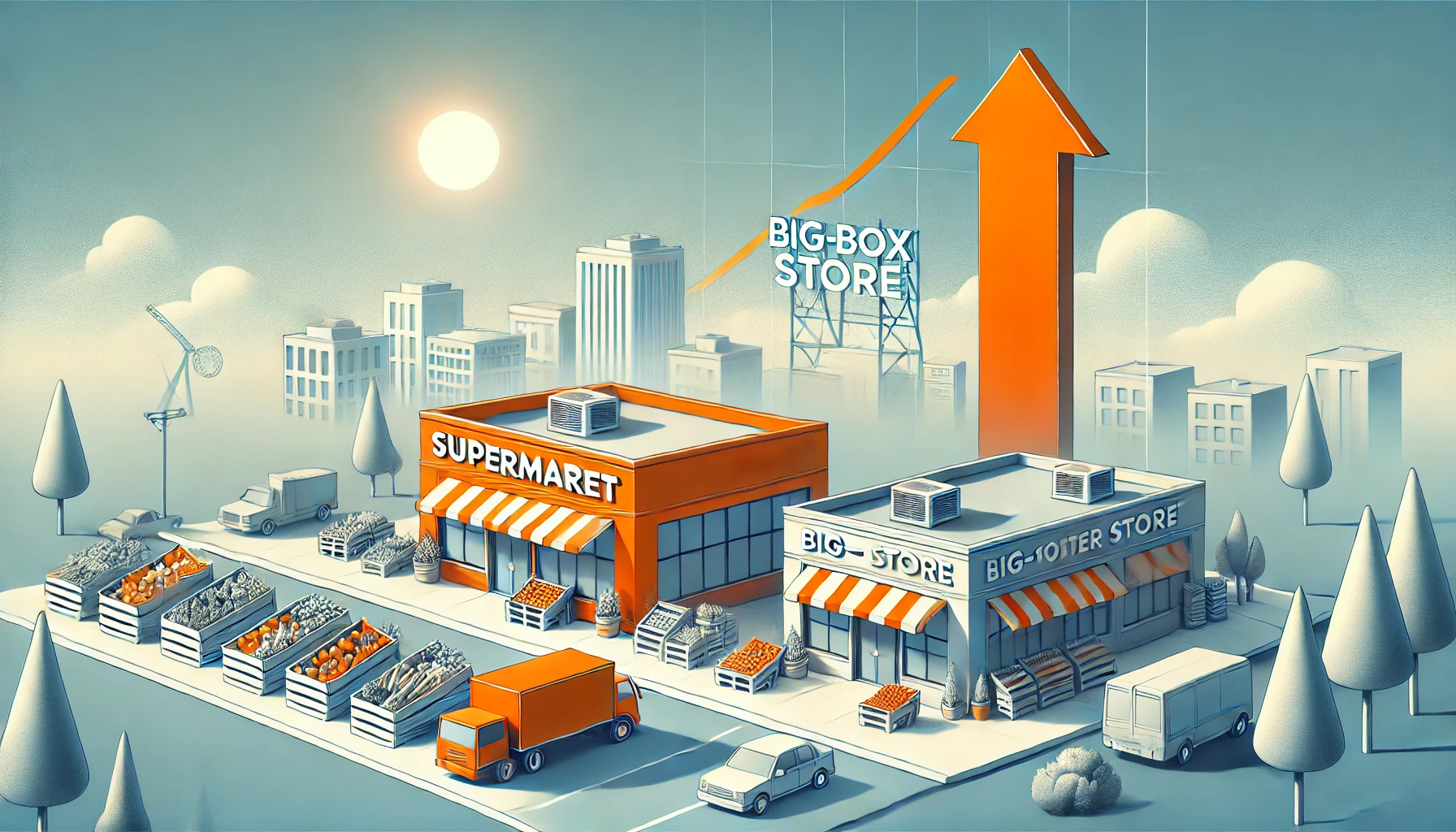1. Introduction
In today’s competitive retail landscape, the battle between local supermarkets and big-box stores is fiercer than ever. With big-box stores leveraging their massive inventory, brand recognition, and marketing budgets, many supermarkets struggle to maintain visibility and market share.
Yet, with the rise of digital consumer behavior, search engine optimization (SEO) offers a powerful tool to help supermarkets compete more effectively. By working with an SEO company, supermarkets can optimize their online presence, attract local customers, and emphasize what makes them unique.
This article explores how partnering with an SEO company can give supermarkets a competitive edge against big-box giants, leveling the playing field and driving long-term growth.
2. Understanding the Challenge: Supermarkets vs. Big-Box Stores
Supermarkets and big-box stores serve similar purposes in the retail market, providing a wide range of everyday essentials like groceries, household goods, and personal care items. However, they differ significantly in scale, product offerings, and marketing capabilities, which directly influences how they attract and retain customers.
Big-box stores, such as Walmart, Target, and Costco, benefit from their extensive resources, including vast distribution networks, massive physical store footprints, and deep pockets for marketing and advertising.
This scale allows them to stock a wider range of products across numerous categories and offer competitive pricing, leveraging bulk purchasing to keep costs low. Additionally, big-box stores frequently run large-scale promotions and seasonal sales that draw in budget-conscious shoppers, making it difficult for smaller competitors to match these price-driven incentives.
The breadth of product ranges in big-box stores also means that they can act as one-stop shopping destinations, appealing to consumers looking for convenience. This ability to cater to diverse needs under a single roof gives big-box stores a competitive advantage, making them particularly attractive to families and customers who prioritize cost savings and convenience. As a result, many customers are drawn away from smaller, independent supermarkets, even if those supermarkets offer a different kind of shopping experience.
However, supermarkets often possess unique advantages that big-box stores lack, allowing them to differentiate themselves within their local markets. Supermarkets, especially independent or regional ones, are typically more attuned to the needs and preferences of their local communities.
This enables them to offer specialized products, including locally sourced produce, organic items, and regional specialties that align with the tastes of nearby consumers. For example, a local supermarket might carry fresh produce from nearby farms, regional delicacies, or imported goods that cater to specific cultural preferences—products that may not be readily available at larger chains.
Additionally, supermarkets can provide a more personalized shopping experience, focusing on customer service and community engagement. In contrast to the impersonal and standardized approach of big-box stores, supermarkets can build relationships with regular customers, offer personalized recommendations, and create a friendly atmosphere that resonates with their target audience.
Many supermarkets host community events, sponsor local initiatives, or support charitable activities, further strengthening their connection with local shoppers. This can foster a sense of loyalty and trust that is difficult for big-box stores to replicate.
The challenge for supermarkets, however, is making these strengths visible in a crowded and competitive marketplace. As more consumers turn to online search engines to make decisions about where to shop—whether they’re searching for “fresh produce near me” or “organic groceries in [city name]”—supermarkets must ensure they are visible online to capture these potential customers.
In an era where consumers rely heavily on digital tools for information, a strong online presence can make all the difference in attracting foot traffic and online orders. This is where search engine optimization (SEO) becomes a critical asset.
An SEO company can help supermarkets ensure that their websites, social media profiles, and other digital assets rank highly in search engine results, especially for location-based searches. By optimizing content for local search terms, enhancing Google My Business listings, and ensuring accurate store information, SEO can help supermarkets become more discoverable to consumers searching for nearby grocery options.
This improved visibility allows supermarkets to leverage their local strengths, such as unique products and community-focused services, and present themselves as a compelling alternative to the big-box stores. With the right SEO strategy, supermarkets can attract customers who value quality, freshness, and a personalized shopping experience, helping them to compete effectively with larger chains despite their differences in scale.
3. The Role of SEO in Leveling the Playing Field
SEO involves optimizing a website to rank higher in search engine results pages (SERPs), making it easier for customers to find a business online. For supermarkets, SEO can be a game-changer in attracting local customers who are searching for groceries, specialty products, or nearby stores. Here’s how:
- Local SEO is particularly important for supermarkets. It ensures that the store appears when potential customers search for terms like “grocery store near me” or “organic vegetables in [city name].” This is essential for capturing the attention of shoppers who are ready to buy.
- Google My Business Optimization can make supermarkets more visible on Google Maps and local search results, showing essential information like opening hours, address, and customer reviews.
- SEO Content Strategy allows supermarkets to highlight what makes them unique—whether it’s offering fresh produce, promoting weekly deals, or hosting community events. This kind of targeted content can help supermarkets attract customers looking for specific products or experiences.
By utilizing these strategies, supermarkets can position themselves more favorably in the digital space, ensuring they stay competitive with larger chains.
4. Key SEO Strategies for Supermarkets
A well-rounded SEO strategy is essential for supermarkets looking to outshine big-box competitors. Here are some core strategies an SEO company might employ:
Local SEO Optimization
Local SEO is the cornerstone for supermarkets, as it targets customers within a specific geographic area. An SEO company can help supermarkets by:
- Optimizing Google My Business (GMB) profiles, ensuring accurate store information and encouraging customer reviews.
- Implementing location-specific keywords like “best supermarket in [city]” to appear in local searches.
- Building local citations through listings in online directories such as Yelp, ensuring consistent NAP (Name, Address, Phone number) across platforms.
Keyword Research & Content Strategy
Understanding what customers are searching for is key to driving organic traffic. An SEO company can:
- Conduct keyword research to identify phrases that local shoppers use, such as “grocery delivery near me” or “specialty cheese store.”
- Develop a content strategy that includes blog posts, recipes, and product guides, positioning the supermarket as a community resource.
- Use long-tail keywords like “organic groceries in [neighborhood name]” to attract niche customers.
On-Page Optimization
On-page SEO ensures that the website’s content is optimized for search engines. This includes:
- Crafting SEO-friendly meta titles and descriptions for each page, targeting keywords and local terms.
- Using structured data markup for product categories, store locations, and services to help Google better understand the site’s content.
- Optimizing image alt texts for product images, improving searchability.
Technical SEO
A smooth user experience is crucial for ranking well and keeping visitors engaged. Technical SEO focuses on:
- Improving website speed to reduce bounce rates, especially on mobile devices.
- Ensuring mobile responsiveness, as many shoppers search for local supermarkets on their phones.
- Fixing broken links and creating a clean site structure to make navigation easier for both users and search engines.
Building a Strong Backlink Profile
Backlinks from reputable websites signal to search engines that a supermarket’s website is trustworthy. An SEO company can:
- Reach out to local food bloggers, asking them to review the supermarket or link to its content.
- Build relationships with local community sites that could feature the supermarket’s events or promotions.
- Use press releases about store openings or charitable activities to earn coverage and backlinks from local news outlets.
5. Using SEO to Highlight Unique Supermarket Strengths
Supermarkets often have qualities that distinguish them from big-box stores, allowing them to carve out a unique niche within their communities. These attributes include their emphasis on local produce, deep involvement in community activities, and offering specialty food items that cater to the tastes and preferences of local consumers.
Unlike large chains that prioritize uniformity across all locations, supermarkets can tailor their product selection and services to align more closely with the needs of their surrounding neighborhoods. By using search engine optimization (SEO), supermarkets can highlight these unique offerings and reach the customers who value them most. Here’s how an SEO strategy can bring these qualities to the forefront:
Promoting Local and Organic Products
Many consumers today prioritize health and sustainability, actively seeking out stores that offer organic produce, locally grown fruits and vegetables, or products from nearby farms. Supermarkets that stock these items have a competitive edge, but they need to make sure this advantage is visible online.
An SEO company can help by creating content that focuses on the benefits of locally sourced products and organic offerings, which can attract health-conscious consumers looking for these options.
For example, the SEO company might develop blog posts, recipe guides, or landing pages that highlight seasonal produce available at the supermarket, such as “5 Recipes Using Fresh, Locally-Grown Summer Vegetables” or “Where to Find Organic Dairy Products in [City].” These pieces of content can be optimized with relevant keywords like “organic grocery store near me” or “local produce in [City],” making it easier for consumers searching for these terms to find the supermarket’s website.
This targeted content can draw in customers who are specifically searching for high-quality, fresh ingredients, helping the supermarket stand out in a sea of generic options offered by big-box stores.
Additionally, showcasing these offerings online through well-optimized Google My Business posts, social media updates, and customer testimonials can further boost visibility and credibility. Reviews that emphasize the freshness and quality of the supermarket’s produce can improve local search rankings, leading to more clicks and in-store visits.
Highlighting Special Deals and Loyalty Programs
Price is often a significant factor in attracting grocery shoppers, and while supermarkets might not always be able to compete with the low prices of big-box chains, they can draw customers through targeted promotions, special deals, and loyalty programs.
An SEO company can help supermarkets make these savings and rewards more visible by creating content around weekly sales, exclusive discounts, and loyalty rewards programs.
For instance, the SEO strategy might include creating dedicated landing pages for each week’s specials, which could rank for search terms like “weekly grocery deals in [City]” or “supermarket discounts near me.” Blog posts featuring “Top 10 Ways to Save on Groceries This Month” that include information about in-store deals can attract budget-conscious shoppers who are searching for savings.
By optimizing these pieces for relevant search queries, supermarkets can ensure that potential customers see their offers before they come across those of larger competitors.
Moreover, an SEO company can help supermarkets implement and optimize loyalty program pages on their website, making it easier for customers to find information about points systems, member-exclusive discounts, or special events.
Highlighting such programs through blog content, social media, and local SEO efforts can foster a sense of value and appreciation among customers, encouraging repeat visits and long-term loyalty.
Showcasing Community Engagement
Community involvement is one of the strongest assets of local supermarkets. Unlike big-box stores that often focus on national or regional campaigns, local supermarkets can directly contribute to their communities, building trust and a sense of connection.
This could include sponsoring local sports teams, hosting charity events, or participating in farmers’ markets. While these activities may generate goodwill among those who attend, they can have an even greater impact if they’re shared with a wider audience through effective SEO practices.
An SEO company can help supermarkets leverage their community involvement by creating content that highlights these activities. For example, writing blog posts or publishing press releases about a charity drive, a food donation event, or a collaboration with a local farm can boost the supermarket’s online presence.
These types of content not only attract positive attention from local news outlets but can also generate valuable backlinks, improving the supermarket’s search engine rankings.
Additionally, these community-oriented activities can be featured prominently on the supermarket’s Google My Business profile, ensuring that customers searching for local grocery stores see evidence of the supermarket’s commitment to their area.
Photos from community events, customer testimonials about the store’s engagement, and announcements about upcoming events can all contribute to a richer and more appealing online presence. This kind of visibility can resonate with local customers who appreciate supporting businesses that give back to the community, creating a sense of loyalty and preference that big-box stores struggle to achieve.
Emphasizing Specialty Food Items and Niche Products
Another key area where supermarkets can distinguish themselves is by offering specialty food items and niche products that cater to specific customer preferences.
This could include international foods, vegan and gluten-free products, gourmet ingredients, or artisanal baked goods. Big-box stores often prioritize mass-market items, making it harder for them to cater to niche markets in the same way that a supermarket can. SEO can help supermarkets showcase these unique offerings to customers who are actively searching for them.
An SEO company can create optimized product pages, blog posts, and guides that highlight these specialty items, using keywords like “gluten-free bread in [City],” “imported Italian pasta near me,” or “vegan grocery store in [Neighborhood].” For example, a blog post on “Top 5 Vegan Products Available at Our Supermarket” can help attract a dedicated vegan community, while a guide to international food ingredients might draw in customers with diverse culinary interests.
By focusing on these niche products, supermarkets can attract a customer base that is willing to go out of their way to find the items they need, setting the supermarket apart from more generic options.
In addition, supermarkets can use customer reviews and testimonials to highlight positive experiences with these specialty products. Featuring these reviews on their website and Google My Business profile can improve local search rankings and build trust with potential customers, showcasing the supermarket as the best place to find unique and high-quality food options.
Leveraging SEO to Highlight Supermarket Strengths
By focusing on their unique strengths, such as promoting local and organic products, highlighting special deals and loyalty programs, showcasing community involvement, and emphasizing specialty food items, supermarkets can carve out a distinct identity that resonates with their target audience.
SEO plays a critical role in making sure these strengths are visible to potential customers who are searching online. Rather than competing directly with big-box stores on their terms, supermarkets can use SEO to spotlight their unique offerings, creating a strong digital presence that emphasizes what makes them special. This positions supermarkets as a preferred choice for local shoppers, not just as an alternative to big-box stores but as the better, more personalized option.
6. Case Studies: Successful Supermarket SEO Campaigns
Examining real-world examples provides valuable insights into how SEO can drive results for supermarkets:
Example 1: Local Supermarket Competes with Big-Box Chain
A local supermarket faced tough competition from a nearby big-box store. By working with an SEO company, the supermarket targeted keywords like “affordable organic groceries in Delhi” and optimized its Google My Business profile. As a result, the supermarket saw a 25% increase in in-store visits from customers who found them through local search.
Example 2: Grocery Store Becomes a Go-To Resource for Recipes
Another supermarket utilized an SEO-driven content strategy, creating a blog with recipes that featured their products. The SEO company identified popular recipe searches like “easy weeknight meals with fresh vegetables.” This content brought in thousands of visitors each month, boosting online sales and in-store foot traffic.
Example 3: Improved User Experience Drives Online Orders
A small grocery store partnered with an SEO agency to improve their website’s mobile experience and page speed. This helped reduce bounce rates and increased online grocery orders by 40%. The improved website also attracted more positive reviews, further enhancing their local search presence.
7. The Cost Advantage of Partnering with an SEO Company
Supermarkets often operate with tight budgets, making it crucial to invest in marketing strategies that offer the best return on investment (ROI). SEO, when done correctly, can be a cost-effective alternative to traditional marketing. Here’s why:
- Lower Cost Compared to Traditional Advertising: Unlike print ads or radio spots that require ongoing spending, SEO efforts build value over time. Blog content, optimized landing pages, and Google My Business profiles can continue to drive traffic months after they’re created.
- Higher ROI: By targeting users who are actively searching for grocery stores or products, SEO tends to convert better than broad marketing efforts. An SEO company can track these results, making it easier to understand the impact of the investment.
- Outsourcing Saves Time and Resources: Partnering with an SEO company allows supermarkets to focus on their core business while leaving the complexities of SEO to professionals. This can save time on training and managing an in-house digital marketing team.
8. Why Supermarkets Should Choose a Professional SEO Company
While some supermarkets might consider managing SEO efforts in-house, partnering with a professional SEO company can provide a range of benefits that make a significant difference in their online success. Choosing the right SEO partner is critical to achieving success in a competitive market.
Here’s how an SEO company can bring specialized knowledge, resources, and strategic support to help supermarkets thrive in a competitive market:
Expertise in Local Market Analysis
One of the key advantages of working with a professional SEO company is their expertise in analyzing local market dynamics. Unlike a generalized approach, local SEO requires a deep understanding of regional customer behavior, preferences, and search trends.
An SEO company can conduct thorough market research to identify specific opportunities for a supermarket to improve its visibility within the local area. This might include analyzing competitors, understanding popular local search terms, and identifying demographic trends that influence purchasing decisions.
For example, an SEO company can pinpoint specific neighborhoods or communities where there is high demand for organic produce or specialty ethnic groceries. By understanding these local nuances, they can tailor the supermarket’s digital strategy to target these areas effectively, using region-specific keywords and location-based optimization techniques.
This helps ensure that when customers in the vicinity search for “fresh produce near me” or “organic groceries in [City],” the supermarket appears prominently in the results. By leveraging this localized approach, supermarkets can capture more traffic from nearby shoppers, driving foot traffic to their physical stores and increasing their market share in the area.
Access to Advanced Tools and Technology
SEO is a data-driven field that relies heavily on the use of advanced tools for keyword research, rank tracking, technical audits, and competitive analysis.
These tools provide insights that are critical for optimizing a website, identifying technical issues, and tracking the effectiveness of an SEO strategy. However, premium SEO tools can be quite costly for a supermarket to purchase and maintain independently. Partnering with an SEO company allows supermarkets to benefit from access to these resources without the significant financial investment.
For instance, an SEO company can use tools like SEMrush, Ahrefs, or Moz to conduct in-depth keyword analysis, identifying high-potential keywords that customers are searching for in the supermarket’s area.
They can also utilize Google Analytics and Google Search Console to track website performance, analyze user behavior, and make data-driven adjustments to the SEO strategy. Additionally, technical audit tools can help identify issues such as slow page speed, broken links, or mobile usability problems that may be negatively impacting search rankings.
Having access to these advanced tools enables the SEO company to provide a more comprehensive service, optimizing the supermarket’s online presence in ways that would be difficult to achieve in-house.
This allows the supermarket to stay ahead of competitors and maximize its visibility without needing to invest in expensive software or dedicate staff time to mastering these complex tools.
Staying Updated with Algorithm Changes
The SEO landscape is constantly changing, as search engines like Google frequently update their algorithms to improve the relevance and accuracy of search results.
These updates can have a significant impact on a website’s rankings, and keeping up with the latest changes is crucial to maintaining a strong online presence. For supermarkets, which often rely on local search visibility to attract customers, any drop in rankings can directly affect foot traffic and sales.
An experienced SEO company monitors these algorithm changes closely and can adapt strategies quickly to ensure that a supermarket’s website remains compliant with the latest best practices.
For example, if Google rolls out an update that places more emphasis on mobile-friendliness or user experience, the SEO company can immediately take steps to optimize the supermarket’s website accordingly. This might involve improving mobile site performance, enhancing page load speeds, or adjusting content to meet new standards.
By staying ahead of these changes, an SEO company ensures that a supermarket’s online presence remains strong and resilient, minimizing the risk of sudden drops in visibility. This proactive approach allows supermarkets to focus on their core operations while trusting that their online marketing is in expert hands, ensuring consistent traffic and engagement from potential customers.
Creating Customized SEO Strategies
Every supermarket has its own set of strengths, target audience, and business goals. A professional SEO company can develop customized strategies that align with these specific needs, ensuring that the approach is tailored to maximize the supermarket’s unique advantages.
This includes creating a personalized roadmap that might focus on local SEO, content creation, link-building, or technical optimizations, depending on the supermarket’s priorities.
For example, a supermarket that specializes in ethnic foods might benefit from content that highlights its diverse product range and recipes, while a store known for its community involvement might focus more on promoting local events and sponsorships.
An SEO company can help develop content that resonates with the supermarket’s audience, using the right keywords, tone, and format to engage potential customers. This targeted approach can help supermarkets connect with their ideal customers more effectively than a generic, one-size-fits-all strategy.
Additionally, an SEO company can provide insights into seasonal trends and opportunities, helping supermarkets capitalize on periods of high demand. Whether it’s promoting fresh produce in the summer or specialty holiday items in the winter, they can adjust the strategy to maximize visibility during peak shopping times, driving more traffic and sales.
Saving Time and Resources
Managing a successful SEO campaign requires a significant investment of time, effort, and expertise. For supermarkets, which already have the demanding task of running daily operations, finding the bandwidth to focus on SEO can be a challenge.
By outsourcing these efforts to a professional SEO company, supermarkets can save valuable time and resources that can be better spent on improving in-store operations, customer service, and other aspects of the business.
An SEO company takes care of the technical details, from conducting audits and optimizing website content to managing local listings and tracking performance metrics.
This allows supermarket owners and managers to focus on their strengths—such as sourcing quality products, building relationships with local suppliers, and enhancing the in-store experience—while knowing that their online presence is in good hands. The time saved by partnering with an SEO company can translate into improved store operations, better customer satisfaction, and ultimately, higher sales.
Measuring and Reporting on ROI
One of the biggest challenges for businesses investing in SEO is understanding the return on investment (ROI). An SEO company provides regular reports and analysis, helping supermarkets understand how their SEO efforts are impacting their bottom line. Through detailed analytics and performance metrics, the SEO company can demonstrate improvements in website traffic, search rankings, and conversions.
For example, monthly reports can show how many new customers found the supermarket through local search, how website visits translated into in-store visits, and how much organic traffic increased due to specific content or campaigns.
This data-driven approach allows supermarkets to see the value of their investment and make informed decisions about future marketing efforts. It also helps identify areas for improvement, ensuring that the SEO strategy evolves in response to changes in customer behavior and market conditions.
A professional SEO company brings the expertise, tools, and strategic insights needed to make this possible. By offering tailored strategies, adapting to algorithm changes, and providing measurable results, an SEO partner can ensure that a supermarket’s online presence is optimized for success.
With the right SEO support, supermarkets can enhance their visibility, connect with the customers who value their unique offerings, and build a strong foundation for long-term growth.
9. Measuring SEO Success: Key Metrics for Supermarkets
To ensure that SEO efforts are paying off, it’s important to track specific metrics. Some key indicators include:
- Organic Traffic: Monitoring the number of visitors coming to the website from search engines.
- Local Search Visibility: Tracking the supermarket’s ranking for local search terms like “grocery delivery near me.”
- Conversion Rates: Measuring the percentage of visitors who make a purchase or visit the store.
- Click-Through Rates (CTR): Understanding how well content is attracting clicks from search results.
- Customer Reviews and Ratings: Higher ratings and reviews on Google My Business can improve search rankings and attract more customers.
These metrics help supermarkets understand the impact of SEO on both their online presence and physical store traffic.
10. Conclusion: How SEO Can Secure a Competitive Edge for Supermarkets
Supermarkets face many challenges in competing with big-box stores, but a strategic focus on SEO can help level the playing field. By targeting local customers, highlighting unique strengths, and continuously optimizing their online presence, supermarkets can attract more shoppers and build a loyal customer base.
Working with an SEO company can ensure that these efforts are implemented effectively, offering a sustainable path to growth in the digital age. As supermarkets continue to adapt to changing consumer behavior, embracing SEO is no longer just an option—it’s a necessity.
Take the Next Step in Growing Your Supermarket’s Online Presence
Ready to elevate your supermarket’s online visibility and compete effectively with big-box stores? Partner with a professional SEO company that understands the unique challenges and opportunities in the grocery industry.
With expert strategies tailored to your needs, advanced tools, and a deep understanding of local markets, we can help your supermarket attract more customers, showcase your strengths, and drive growth.
Contact us today for a free consultation and discover how we can help your supermarket become the go-to choice for local shoppers. Let’s work together to build a strong digital presence that sets you apart from the competition!





